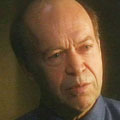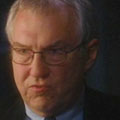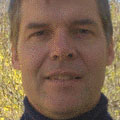Profiles of three scientists and one official who say their work on climate change was suppressed by the Bush administration.
![]()
Hot Politics Web site reports by the Center for Investigative Reporting, Inc.
Since 2004, a string of government scientists have charged the Bush administration with attempting to suppress scientific data concerning climate change. The alleged tactics vary from case to case, but taken as a whole it appears that White House officials have tried to tone down the connection between climate change and human activity, such as burning fossil fuels.
According to current and former government scientists, Bush administration officials worked to bury a major report on the possible consequences of rising temperatures; improperly edited major reports to downplay the role of human activity in rising temperatures; and tried to keep scientists working on hard-hitting climate research from speaking to the media.
A 2007 probe by the nonprofits the Union of Concerned Scientists and the Government Accountability Project surveyed nearly 300 researchers and found that nearly half experienced -- or perceived -- pressure to purge references to global warming and climate change from reports and other documents.
Congressional investigators in both the House and the Senate are now examining the allegations and requesting documents from an array of government agencies.
Here are profiles of a few of the government scientists and officials who charge that their work has been suppressed:
James Hansen, Ph.D.
Climate scientist and director of the Goddard Institute for Space Science (GISS), part of the National Aeronautics and Space Administration (NASA). Dr. Hansen also works as a professor at Columbia University, in the Earth and Environmental Sciences Department.

“In my more than three decades in the government, I have never seen anything approaching the degree to which information flow from scientists to the public has been screened and controlled as it is now. I am referring specifically to research on climate change that yields results of possible public interest that would likely be interpreted as being relevant to policy considerations on climate change.”
From the Distinguished Public Lecture Series at the Department of Physics and Astronomy, University of Iowa, Oct. 26, 2004.
Area of Expertise: Dr. Hansen is an expert in physics and astronomy. He studies changes in the Earth's atmosphere by using data from satellites and is considered one of the pioneers of global warming theory; Dr. Hansen testified in front of Congress in the 1980s about the issue. He is also outspoken about his belief that the earth may now be near a "tipping point" if levels of greenhouse gases are not drastically reduced soon.
Incidents of Suppression: Hansen has publicly cited numerous incidents of suppression of his research about global warming by senior NASA officials and press officers.
On Oct. 26, 2006, Hansen was quoted in an article by Andrew Revkin of The New York Times as saying that then-NASA Administrator Sean O'Keefe asked him not to discuss the dangerous consequences of climate change.
In December 2005, Hansen presented a lecture on the importance of reducing emissions to the American Geophysical Union and announced on ABC News that data showed 2005 to be the "warmest year on record." According to Hansen's account, published in a March 2007 Climate Science Watch report (PDF file), NASA public affairs officer George Deutsch "told Hansen that there had been a 'storm of anger at headquarters' and threatened him with 'dire consequences' if he kept making similar remarks."
Fallout: Because of Hansen's very public complaints, NASA Administrator Michael Griffin e-mailed the entire agency in early 2006 to say that press officials may not "alter, filter or adjust" the work of NASA scientists. Dr. Hansen later told investigators with the Climate Science Watch project that "as of noon of March 16, 2006, 285 NASA scientists and engineers had signed a 'Statement of support for NASA's commitment to openness.' The statement 'fully supports Dr. Hansen in his professional capacity to continue alerting the public about global warming' and encourages 'all NASA affiliated scientists and engineers to openly present their expertise for the public good.'"
Rick Piltz
Former senior associate with the U.S. government Climate Change Science Program (CCSP), which coordinates the climate change research of 13 different federal agencies. From 1991-1994 he was a Congressional staffer for the House Committee on Science, Space, and Technology.

“I have not seen a situation like the one that has developed under this administration during the past four years, in which politicization by the White House has fed back directly into the science program in such a way as to undermine the credibility and integrity of the program in its relationship to the research community, to program managers, to policymakers, and to the public interest.”
From Piltz's 2005 resignation letter.
Area of Expertise: Piltz attended the University of Michigan and taught political science at the University of Texas, Austin. He has spent his career working in the policy arena, particularly in the area of environmental science and energy issues.
Incidents of Supression: In 2000, the U.S. Government Climate Research Program published the National Assessment of the Potential Consequences of Climate Variability and Change, a multi-year, $10 million government study. Over the next few years, links and references to the National Assessment were deleted and removed from U.S. government Web sites and other forums discussing climate change.
Piltz also helped publicize the inappropriate editing of government reports by top officials, including Phil Cooney, a former lobbyist for the energy industry who was chief of staff for the White House Council on Environmental Quality. Cooney resigned after his actions became public and took a job with ExxonMobil.
Fallout: Piltz resigned from government in June 2005 and now runs Climate Science Watch, a project of the Government Accountability Project. The group has released two recent reports (one with the Union of Concerned Scientists) to expose additional incidents of scientific suppression by the Bush administration in recent years. Piltz has testified numerous times in the past two years before Congressional committees investigating the integrity of government climate science.
Thomas R. Knutson, Ph.D.
Research Meteorologist, Climate Dynamics and Prediction Group, Geophysical Fluids Dynamics Lab (GFDL) of National Oceanic and Atmospheric Administration (NOAA), a U.S. government agency.

“The impression I had … is that at times NOAA Public Affairs was becoming more of an obstruction than a promoter of interaction between GFDL scientists and the media.”
Knutson's Congressional Testimony, Feb. 7, 2007.
Area of Expertise: Dr. Knutson is an expert in climate modeling, working with hurricane specialists to investigate the link between climate change and tropical storms.
Incidents of Suppression: Dr. Knutson told researchers from Climate Science Watch and the Government Accountability Project that he faced several instances of political interference in his work, primarily because of NOAA media policies and the way public affairs officials attempted to control the communication of scientific results.
In September 2004, Dr. Knutson published a widely quoted paper in the Journal of Climate that indicated that increased levels of CO2 in the atmosphere could lead to more intense tropical storms, more rain and flooding. The following year, Dr. Knutson received several media requests to appear on television and, after agreeing, he was told by NOAA public affairs officials that the "White House said no" to his appearances.
FOIA records obtained by Climate Science Watch investigators show that instead of approving requests for interviews with Knutson, the NOAA public affairs office sent all media inquiries related to hurricanes to Dr. Chris Landsea, another NOAA scientist who, unlike Knutson, disputes any connection between hurricane strength and global warming.
After Hurricane Katrina, NOAA scientists, including Dr. Knutson, received numerous requests for media interviews. FOIA documents obtained by Climate Science Watch show that NOAA public affairs officials denied one such request for Knutson after a back-and-forth discussion with a high level public affairs officer at the Department of Commerce, of which NOAA is a part, about what Knutson would say concerning hurricane strength and global warming.
Fallout: In March 2007, the Department of Commerce released a comprehensive update to its media policy, in part to deal with questions about political interference. Congressman Bart Gordon (D-Tenn.), chairman of the House Committee on Science and Technology, said the changes were welcome but did not go far enough to protect the individual scientists.
Craig Perham
Marine Mammals Management, U.S. Fish and Wildlife Services, Alaska
Area of Expertise: Perham is a marine biologist specializing in polar bears.
Incidents of Suppression: Perham was invited by the World Wildlife Fund to visit villages in Siberia to discuss ways that residents could prevent or minimize dangerous interactions with polar bears. A young girl had been killed and villagers were noticing increasing sightings of polar bears near human settlements.
The invitation to Perham, and trips by other scientists, prompted several internal Fish and Wildlife memos which were leaked to environmental groups and the press. The memos said:
"Please be advised that all foreign travel requests … and any future travel requests involving or potentially involving climate change, sea ice and/or polar bears will also require a memorandum from the regional director to the director indicating who'll be the official spokesman on the trip and the one responding to questions on these issues, particularly polar bears."
Fish and Wildlife scientists were also asked to give "a statement of assurance that these individuals understand the administration's position on these issues" and were pressured not to discuss climate change while overseas. Critics say this type of government control of simple scientific discussions is unprecedented.
Perham himself has not spoken publicly about the incident, which was revealed by other whistleblowers.
Fallout: After the memos were made public, Fish and Wildlife Director H. Dale Hall held a news conference and denied that the memos were a form of censorship. He described the content of the documents and said they were part of a policy to establish a clear agenda and clarify the appropriate spokesperson for international meetings.
Oriana Zill de Granados is the productions director of the Center for Investigative Reporting. She also served as a senior producer on Hot Politics.
home + introduction + watch online + reports + timeline + interviews + map + join the discussion
correspondent's chat + site map + readings & links + dvd/vhs & transcript + press reaction + credits
privacy policy + journalistic guidelines + FRONTLINE series home + wgbh + pbs
posted april 24, 2007
FRONTLINE is a registered trademark of wgbh educational foundation.
earth photo illustration copyright © corbis
web site copyright WGBH educational foundation







